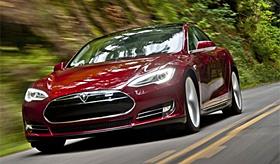Unlike other recent 'green'-energy bankruptcies involving federal funding, taxpayers actually have gained money from the automaker's 2009 loan.
 Tesla Motors repaid the remaining portion of its $465 million federal loan on Wednesday, marking a bright spot for a government program tattered by poor oversight and multiple bankruptcies.
Tesla Motors repaid the remaining portion of its $465 million federal loan on Wednesday, marking a bright spot for a government program tattered by poor oversight and multiple bankruptcies. The California electric car company, weeks after reporting itsfirst-ever profit at $11.2 million last quarter and after having been called a "loser" by Republican presidential candidate Mitt Romney in 2012, paid the remaining $451.8 million to the Energy Department nine years ahead of schedule. It also called itself the "only American car company to have fully repaid the government."
CEO Elon Musk, in an interview with Bloomberg, said that the U.S. government made a profit of "over $20 million" from interest and what he called a "bonus" payment. Other sources, however, put the profit at about $12 million.
"It really feels good to have repaid the U.S. taxpayer; that's really what's important here," he said. "I feel we had a moral obligation to discharge this loan at the earliest reasonable opportunity while still being good to the institutional shareholders that have supported Tesla over the years."
Tesla is indeed the only automaker to have repaid its low-interest loans from the $34.4 billion Advanced Technology Vehicles Manufacturing program, initially set up by President George W. Bush in 2008 and carried out by President Barack Obama starting in 2009. Tesla's loan was approved to develop and manufacture the Model S sedan. So far, the company says it has delivered 4,900 cars in the first quarter – a few hundred more than either the Nissan Leaf or Chevrolet Volt – and expects to sell more than 20,000 cars through 2013. Along with its rising stock price, the tough critics at Consumer reports awarded the Model S its highest-ever score (99 out of 100) and praised its performance and quality.
Ford has repaid about $400 million from its $5.9 billion loan – made for plant upgrades for fuel-efficient models such as the Focus Electric – but said it won't pay it all off until 2022. Nissan, which received $1.4 billion for its recently opened battery plant in Smyrna, Tenn., did not release specifics on its loan repayment schedule, according to Bloomberg. The Energy Department did not return calls or emails from MSN Autos asking for further information.
However, two of the five loans made under the ATVM program, a $529 million loan to Fisker Automotive and a $50 million loan to Vehicle Production Group, may never be repaid. Fisker is in the process of declaring bankruptcy and a possible sale, but still owes $192 million from the amount it withdrew.
When the company missed its first loan repayment in April, the government seized $21 million from Fisker's reserve accounts but has no plans to recoup the remainder. Fisker's loan was frozen in 2011 when the company failed to meet financial requirements. A congressional investigation into whether the Energy Department's mishandled the funds is under way.
VPG, a maker of disabled-accessible vans that received money to sell models running on compressed natural gas,declared bankruptcy early this month.
Chrysler took a shot at Tesla's statement that it was the only American car company to repay federal loans, saying that it had repaid a $5.1 billion government loan in 2011 six years ahead of schedule. "Question: short memory or short-circuit," spokesman Gualberto Ranieri wrote on Chrysler's corporate blog.
In 1983, during the first time Chrysler was bailed out, the company repaid its $1.2 billion loan in full, which gave the government a roughly $300 million profit, according to Bloomberg. However, while Chrysler did repay the entirety of its 2009 bailout, the "old" Chrysler that was killed in bankruptcy ate $1.3 billion in taxpayer money that the company will not repay.
It's much worse for General Motors. Taxpayers could stand to lose nearly $20 billion from the company's $49.5 billion bailout, despite successive sales of Treasury-owned shares that will see the government exit ownership by 2014.
autos.msn.com
No comments:
Post a Comment